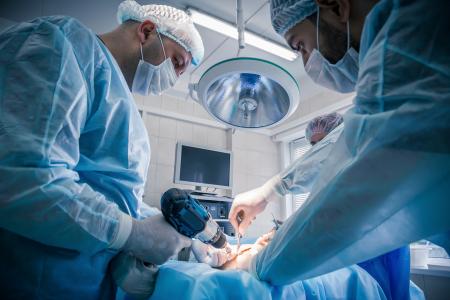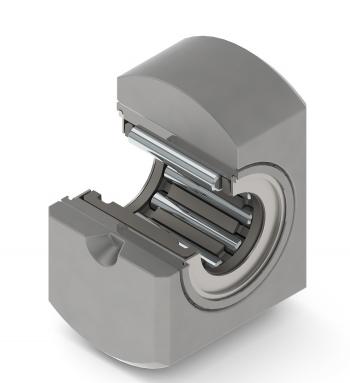Precision bearings for medical applications: These factors determine performance and reliability
24th Feb 2023 Medical devices place extremely high demands on the reliability of their components. With applications including surgical power tools, ventilators and heart pumps, precision bearings are among the critical components on which the safety of treated patients often directly depends, thus rendering the specification and selection of precisely fitting rolling bearings all the more important.
Medical devices place extremely high demands on the reliability of their components. With applications including surgical power tools, ventilators and heart pumps, precision bearings are among the critical components on which the safety of treated patients often directly depends, thus rendering the specification and selection of precisely fitting rolling bearings all the more important.
The development and approval of medical products is often a protracted and costly process. Each component must be consciously selected to continually meet the demands on performance and reliability, even after years of use under difficult ambient conditions and operation at high loads. In addition to the special requirements of the application, designers must also consider factors such as corrosion resistance, lubrication and the materials used for the ball bearings. With precisely fitting precision bearings, these reduce the risk of expensive redesigns and renewed approval processes, not to mention the consequences of a failure occurring in practical use.
Special materials improve corrosion and temperature resistance
For surgical tools and medical devices that require repeat sterilisation, corrosion resistance is a critical factor. For this reason, it is essential that the bearings used in the devices can withstand both the aggressive chemicals used in the sterilisation process and the high temperatures of up to +140°C which are encountered in the autoclaves. As a result, care must be exercised when selecting the material for the rolling elements, rings and cage. Good results have been achieved with the high-performance AMS5898 / X30CrMoN15-1 (Martensitic Stainless Steel), for example, which has a high chromium content of 14 to 16 percent and thus provides a considerably higher level of corrosion resistance than standard rolling bearing steels.
Well lubricated: For a long service life and biocompatibility
Good lubrication is also vital to bearing performance. The type and quantity of lubricant has a significant effect on the functional characteristics and service life of the respective application. For bearing systems that rely on grease lubrication, it must be ensured that the lubrication is biocompatible so that damage to the patient’s health is averted even if the lubricant comes into contact with tissue. It is often advisable to specify an NSF-certified H1/H2 lubricant. H1 lubricants are classified as safe for human consumption in small quantities or very few parts per million. H2 lubricants are regarded as suitable for use in foodstuffs but are not specifically food-grade products. Depending on the use of the medical device, biocompatible lubricants in accordance with DIN EN ISO 10993 can also be considered.
In the case of heart pumps and other implants, bearing lubrication may not be possible at all, so that any risk to the patient arising from the lubricant can be ruled out. Precision bearings produced from special materials can lend a helping hand in such cases, ensuring reliable performance and a long service life even without lubrication. This is also true in cases where other liquids are in direct contact with, or even flow through, the ball bearing.
Design and material determine wear resistance
The correct choice of suitable ball and ring materials and the right product design also ensure that the high-precision bearings – and consequently the medical devices – have a long service life. One material that can be used to improve the life and wear resistance of a bearing is AMS5898 / X30CrMoN15-1 – a martensitic, through - hardened and corrosion-resistant steel. This material is ideal for surgical tools thanks to its ability to withstand the aggressive chemicals used in the sterilisation process. Silicon nitride is one of the ball materials used in medical applications. With its inherent mechanical properties, this material offers excellent performance, even in applications with poor lubrication or where lubrication is not possible. Bearings made of stainless steel X65Cr13 / 1.4037 have also proven successful in medical technology applications and are suitable for use in breathing apparatus, for example. They combine good load carrying capacity with a high fatigue strength and stability.
Even load distribution thanks to an optimized cage design
The correct choice of cage design and cage material is also crucial to the performance of a precision ball bearing. The fundamental purpose of the cage is to maintain a uniform distance between the rolling elements, in order to prevent contact between them, and thus ensure an even distribution of load within the bearing. The cages can also be designed in such a way as to reduce torque and minimise the generation of heat. This requires the selection of a cage material that exhibits the greatest possible degree of wear resistance in order to optimise lifetime, with good options including high-performance plastics such as Polyetheretherketone (PEEK). This material is also certified by NSF International as compatible with the human body and, as a result, is ideally suited to use in medical applications. Thanks to their low mass, corrosion-resistant properties and low friction, these materials also reduce wear and heat generation, with the result that the bearings can be operated at higher speeds and the service life of the grease is extended. Additionally, a pre-requisite for any medical applications is the resistance to repeated serialisation and radiolucency characteristics. In terms of ventilators, Torlon cages offer a long service life at an affordable price, while cages made of PEEK provide the ideal solution for heart pumps: as the material is biocompatible, it is also an option for applications that remain in the human body for more than 24 hours.
High demands on documentation and traceability
In addition to factors such as material and lubrication, which contribute directly to the reliability of precision bearings, documentation on components is also a key aspect governing use in the medical sector. The demands on the quality assurance and traceability of devices and components far exceed comparable PPAP (Production Part Approval) processes that are commonly encountered in other sectors. It must be ensured that the bearing system is supplied with the relevant component documentation in accordance with the ISO 9001 quality management standard and that this documentation is retained for at least 15 years. The documentation should also include certificates issued in accordance with BS EN 10204:2004 including Type 3.1 with traceability to raw material source. With this European standard on inspection certificates for steel (and other) products, suppliers can verify that the legal and regulatory requirements relating to the chemical and mechanical properties of the steel are met.
Example from practice: Special precision bearings for surgical power tools
 Surgical power tools, such as saws used in orthopaedic surgery, convert rotary motion from the motor into linear motion. The bearings are critical to tool movement and efficient, uninterrupted operation. HQW was recently commissioned by a surgical power tool manufacturer to develop a new bearing unit for a high-performance surgical saw. The bearings had to be sufficiently compact to fit inside the tool’s slimline design, while still offering the necessary stability to accommodate high loads and operating speeds. A maximum level of corrosion resistance was also required. The experts at HQW Precision recommended a needle roller bearing unit that was appropriate to both this specification and the prevailing load and speed. As the system is sterilized on regular basis, a special material with a high chromium content of around 20 percent and boasting a high level of corrosion resistance was chosen for the needle bearing ring. Needles produced from the material SV30 and a cage made of PAI were also used.
Surgical power tools, such as saws used in orthopaedic surgery, convert rotary motion from the motor into linear motion. The bearings are critical to tool movement and efficient, uninterrupted operation. HQW was recently commissioned by a surgical power tool manufacturer to develop a new bearing unit for a high-performance surgical saw. The bearings had to be sufficiently compact to fit inside the tool’s slimline design, while still offering the necessary stability to accommodate high loads and operating speeds. A maximum level of corrosion resistance was also required. The experts at HQW Precision recommended a needle roller bearing unit that was appropriate to both this specification and the prevailing load and speed. As the system is sterilized on regular basis, a special material with a high chromium content of around 20 percent and boasting a high level of corrosion resistance was chosen for the needle bearing ring. Needles produced from the material SV30 and a cage made of PAI were also used.
The bearings are located near to the end of the cutting tool and often operate within the patient’s body. For this reason, a special biocompatible lubricating grease was specified. The bearing unit was also required to operate with a high degree of precision and low backlash to ensure that the saw worked precisely and thus achieve the best possible surgical result for both surgeon and patient. The small bearing unit measures 4 x 13 x 8 mm, with the fit between the individual bearing components amounting to just a few microns. Thanks to this improved design, the service life of the surgical device has increased many times over, thus contributing to patient safety throughout the entire life cycle of the medical device.
Joint development for maximum performance
A wealth of applications exists for rolling bearings in medical technology – from implantable devices, heart pumps and breathing apparatus through to high-precision surgical instruments and robot-assisted surgical equipment. Maximum reliability and fail-safety take centre stage here alongside often varying demands on material and properties. Optimal results, as in the above example, are achieved when designers of the medical device or component work closely with experts in precision bearings. HQW supports its customers in this respect by offering comprehensive services – from the design and engineering of suitable bearing systems to comprehensive tests and analyses in an internal, state-of-the-art laboratory. HQW is the market leader for high-precision ball bearings in Europe and specialises in customised high-end rolling bearings and bearing assemblies, which are produced to the highest standards in Germany and are characterized by the highest possible degree of quality, accuracy and precision, ensuring a long service life and maximum safety for the patient. HQW precision bearings are used successfully by leading companies in medical systems as well as in the aerospace industry, high-speed machine tool spindles and robotics applications.